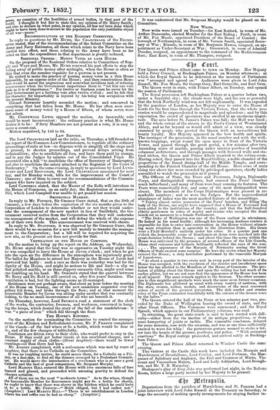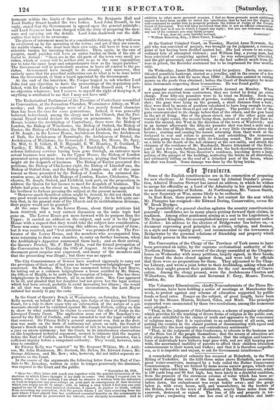311ttropnlio.
Deputations from the parishes of Marylebone and St. Pancras had a joint interview with Lord John Russell at the Treasury on Saturday, to urge the necessity of making speedy arrangements for staying further in-
'ferments within the limits of those parishes. Sir Benjamin Hall and Lord Dudley Stuart headed the two bodies. Lord John Russell, in his reply, stated that the Government is agreed upon the general principle ; and Lord Seymour has been charged with the duty of preparing the mea- sure and carrying out the details. Lord John shadowed out the diffi- culties that have to be overcome.
The places of interment must be at a considerable distance., or they will soon be swallowed up by the spreading of the towns; and yet if they are remote, the middle classes, who must bear their own costs, will have to bear a con- siderable burden for interring their families. Then, again, in the case of paupers, small parishes will have an undue burden on them if the site of burial be distant : " there are in the old parts of the town very small pa- rishes, which of course will be neither able to go to the same expenditure nor to take the same large and comprehensive view as the larger parishes." The Government will be particularly anxious to leave all control to the pa- rishes. Government have enough to do already ; and moreover, they entirely agree that the parochial authorities can do what is to be done better than the Government, or than a board appointed by the Government. At the end of the interview, Mr. Cooper begged to ask whether Lord John had any objection to have the proceedings of the deputation pub- lished, with his Lordship's remarks ? Lord John Russell said, " I have no objection whatever; but I reserve to myself the right of denying it, if anything is attributed to me that I may not have said."
The Ecclesiastical Parliament of the Province of Canterbury assembled in Convocation, at the Jerusalem Chamber, Westminster Abbey, on Wed- nesday; and the proceedings were of a less merely formal character than has been the case for some generations. Indeed, it was generally believed, beforehand, among the clergy and in the Church, that the Pro- vincial Synod would declare its sitting en permanence. In the Upper House, besides the Archbishop of Canterbury, there were the Bishop of London, the Bishop of Winchester, the Bishop of Oxford, the Bishop of Exeter, the Bishop of Chichester, the Bishop of Lichfield, and the Bishop of St. :Asaph ; in the Lower House, Archdeacon Denison, the Archdeacon of Bath, the Archdeacon of Barnstaple, the Archdeacon of Bristol, the Archdeacon of Maidstone, the Reverends J. Slany, Dr. Moore, Dr. Spry, Dr. Mill, G. E. Gillett, H. E. Majendil, R. W. Huntley, E. Goddard, J. Yardley, T. Mills, H. A. Woodgate, T. Randolph, J. Harding. The solemn initiatory services having been gone through, an entrance upon actual business was made. In the Upper House, the Bishop of London presented seven petitions from several dioceses, praying that Convocation might sit for despatch of business. The Bishop of Exeter presented five petitions, the Bishop of Chichester eight, the Bishop of Llandaff one, the Bishop of Oxford four, and the Bishop of St. Asaph one, all of the same tenour as those presented by the Bishop of London. An animated dis- cussion arose, in which the Bishops of London, Exeter, Chichester, Win- chester, St. .ti ' Asaph, Oxford, and Lichfield, took part, on the proposition to address the Queen for her licence to meet for despatch of business. The debate had gone on for about an hour, when the Archbishop appealed to his brethren to forbear pressing the subject at the present moment
"However much Synodical action might be desired, he did not think that any good would accrue frem petitioning her Majesty ; for he felt quite cer- tain that, in the present state of the Church and its multitudinous divisions, their prayer would not be granted."
At the same time in the Lower House, about thirty petitions hiid been received, and a very earnest discussion on the same topic had gone on. The Lower House got more forward with its purpose than the Upper ; it carried an address on the subject, and sent it to the Upper House with a request that they would take the subject into consideration. There was some demur to receiving this address, on the ground of form ; but it was received, and "best attention" was promised for it. The Pro- locutor of the Lower House, and the members who accompanied him, were returning to their own chamber, to enter on further business, when the Archbishop's Apparitor summoned them back; and on their arrival, the Queen's Proctor, Mr. F. Hart Dyke, read the formal prorogation of the Convocation to Thursday the 19th of August. At the reading of this document great surprise was expressed, and many of the members said that the proceeding was illegal ; but there was no appeal.
The City Commissioners of Sewers have resolved rigorously to carry out the provisions of their act of last year so far as "common lodginghouses ' are concerned. On Monday, Mrs. Case was summoned before the Lord Mayor, for letting out as a common lodginghouse a house certified by Mr. Simon, the Officer of Health, to be unfit for the reception of lodgers. She has three lodginghouses in Primrose Street, all in an unfit state. Mrs. Case appeared to be ill, and pleaded that her daughter had not given her the legal notices -which had been served, probably to avoid increasing her illness ; she would do all that was required. Under these circumstances, the Lord Mayor ordered her merely to pay the costs.
In the Court of Queen's Bench at Westminster, on Saturday, Sir Fitzroy Kelly moved, on behalf of Mr. Ramshay, late Judge of the Liverpool County Court, for a rule to show cause why an information of the nature of a quo warranto should not be exhibited against Mr. Joseph Pollock, calling on him to show by what authority he claims to exercise the office of Judge in the Liverpool County Court. The application arose out of 'Mr. Ramshay's re- moval by the Earl of Carlisle, and, was intended to test the legal validity of that removal. Sir Fitzroy Kelly's general argument was, that as the deci- sion was made on the basis of testimony not given on oath, the Court of Queen's Bench ought to remit the matters of fact to be inquired into before a jury on sworn testimony ; but the Court, in its interlocutory observations on the lengthened technical argument, seemed to intimate that the inquiry before the Earl of Carlisle, as Chancellor of the Duchy of Lancaster, was a sufficient inquiry before a competent authority. They would, however, take time to consider.
Sir Fitzroy Kelly was "assisted" by Mr. Sergeant Wilkins, Mr. J. Addi- son, Mr. John Henderson, Mr. Davison, Mr. Dykes, Mr. Edward James, Mr. George Atkinson, and Mr. Rew ; who, however, did not inflict separate ar- guments on the Court.
In the course of the arguments the following letter from the Earl of Car- lisle to Mr. Ramshay, written in order to temper generously the dismissal, was exposed to the Court and the public.
" November 24, 1851.
" Dear Sir—This letter will reach you together with the painful intimation of the decision to which I have thought it my duty to come. One thing I request you to believe, which is, that nothing I am about to observe is written with the intention or wish to deprecate any proceedings on your part in consequence of that decision which you might see fit to adopt : still, in taking a step which I feel you can only regard as one of the most inimical character, I cannot, in justice to truth, refrain from recording my conviction, that the person whom I am thus removing from the post where I have placed him has conferred essential benefits on the community in the midst of whom he prosecuted his labours, now abruptly terminated. And in addition to other more personal reasons, I feel on these grounds much additional sorrow to have been unable to resist the conclusion that he had not the degree of self-command to enable him to properly perform the duties of Judge of the County Court of Liverpool. You will have perceived that this is not an official communica- tion, still less is it one to which I expect any reply ; but you are welcome to make. any use of its contents you may think proper. " I am, dear sir, your faithful servant, CARLISLE." " William Ramshay, Esq., 2 Hare Court, Temple."
At the Central Criminal Court, on Tuesday, Harriet Anne Newman, the girl who was convicted of perjury, was brought up for judgment, a reserved point of law having been decided against her. She had sworn to an extra- ordinary tale of attempted violence ; and William Day, a young man„has been convicted of conspiring against her : he was subsequently lilieratid, and the girl prosecuted, and convicted. As she had suffered much' from 41. ness in prison, the Recorder sentenced her to be imprisoned for four months only.
On Wednesday, James Heilbronn was tried for perjury. Davis, an uneer- tificated penniless bankrupt, started as a jeweller, and in the course of a few months he got into debt for more than 70001. ; Heilbronn assisted in raising money on the goods thus obtained ; before the Court of Bankruptcy he made- false statements respecting these transactions. He was found guilty.
A singular accident occurred at Woolwich Arsenal on Monday. When new guns are received from contractors, they are tested by firing an extra charge. Four fifty-six pounders were to be tried on Monday. Each was. loaded with twenty-eight pounds of powder, wadding, and a fifty-six pound. shot; the guns were lying on the ground, a short distance from a butt; they were fired by means of portfires calculated to burn long enough to ena- ble the man who fires them to get out of danger. The portfire of one of the guns communicated to its charge before that of the others, and the gun burst in the act of firing. One of the pieces struck one of the other guns, and turned it right round, the muzzle being then, instead of nearly due East to- wards the mound, due West in the direction of the town of Woolwich; and in an instant afterwards the fifty-six pounder shot was fired a mile and a half in the line of High Street, and only at a very little elevation above the houses ; starting and causing the horses returning from their _work at the dockyard to rear and refuse to proceed, and astonishing the numerous workmen going home to dinner with its whizzing sound. The shot . passed on a little to the South of the tall chimney at the saw-mills, and struck the chimney of the residence of Mr. Macdonald, Master Attendant of the Dock-. yard ; and a few yards further, knocked down the back-drawingroom chim- ney of Mr. Morgan, the Store-Receiver's residence, knocking down a large portion of the parapet of the building, scattering the bricks in all directions, and ultimately falling on the roof of a detached part of the house, where the shot was found. Some damage was done by the flying bricks.



























 Previous page
Previous page